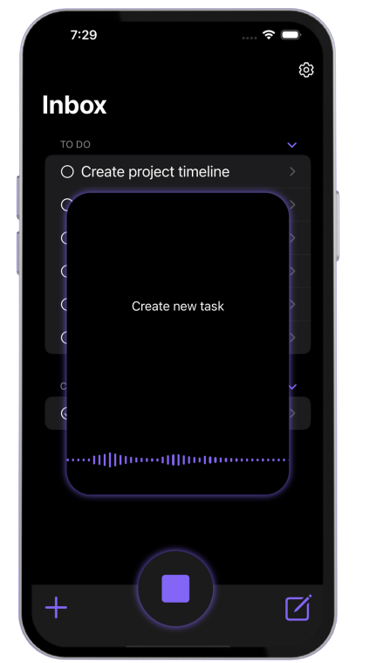Introduction: Decision Fatigue Isn’t Laziness — It’s a Brain Overload
Decision fatigue isn’t just a buzzword in productivity circles—it’s a real psychological phenomenon that affects the brain’s ability to make choices after prolonged mental effort. If you’ve ever felt paralyzed by simple decisions after a long day, you’re not alone. It’s not that you don’t care. It’s that your mental resources are simply depleted.
In today’s world—overflowing with notifications, options, and endless to-dos—our brains are constantly being forced to decide: what to eat, what to wear, what to respond to, what to ignore. Eventually, that mental strain adds up. And for many, it’s not just about feeling tired—it becomes a trigger for emotional shutdown, procrastination, or even symptoms of depression.
This article explores how decision fatigue affects your brain, how it connects to mental health struggles, and how you can build systems—like voice-first planning tools—to reduce the load before it breaks you.
The Hidden Weight of Everyday Choices
Every day, the average adult makes around 35,000 decisions. While most are unconscious and minor, the cumulative effect on our mental energy is substantial. This phenomenon was studied extensively by psychologist Roy Baumeister, who coined the term “ego depletion” to describe the reduced capacity for self-control after extended decision-making.
When your brain constantly engages its “System 2”—what Daniel Kahneman describes in Thinking, Fast and Slow as the slow, analytical part of your mind—it begins to resist further cognitive effort. This is why, after a long day, choosing dinner feels like an impossible task, or replying to one more email feels unbearable.
The tragedy? We often blame ourselves for what is, in fact, a feature of how human cognition works. Our brain bandwidth is limited. And when we ignore that truth, burnout is inevitable.
From Fatigue to Fracture: When the Mind Stops Deciding
As decision fatigue intensifies, it can lead to more than just unproductive afternoons. It can evolve into full-scale avoidance, irrational decision-making, or even a form of cognitive shutdown. Clinical psychologists have observed that individuals with chronic stress or early-stage depression often report “feeling overwhelmed by basic choices” or “not being able to think clearly.”
This isn’t a coincidence. According to the American Psychological Association, mental fatigue and emotional dysregulation are early signs of burnout and, when left unaddressed, can lead to deeper psychological distress. For those already navigating depression, decision fatigue can amplify their symptoms—making them feel even less capable of engaging with the world.
Small decisions begin to carry emotional weight. A to-do list becomes a source of guilt. The mind, already exhausted, starts protecting itself the only way it knows how: by shutting down.
Decision Fatigue and Depression: A Dangerous Loop
The link between decision fatigue and depression isn’t just theoretical—it’s well-documented in clinical settings. Depression impairs executive functioning, which includes planning, prioritization, and decision-making. And when these mental faculties are already under strain, the endless micro-decisions of modern life become unbearable.
It’s a loop: You’re too tired to decide → you delay the task → guilt builds → the task gets heavier → the emotional burden deepens.
👉 If you want to explore how procrastination works and how to break it with practical psychology-backed strategies, check out our article on task avoidance and how to overcome it.
Neuroscientifically, this process involves imbalances in neurotransmitters like dopamine and serotonin—key players in motivation and mood regulation. When decision fatigue sets in, even small wins feel meaningless. And without those little victories, the spiral toward mental fatigue quickens.
This is why reducing decision load is not just a productivity hack—it’s a mental health strategy.
Vozly and Voice-First Planning: Less Thinking, More Doing
One of the most effective ways to combat decision fatigue is to reduce the number of decisions you need to make. Not by doing less—but by planning smarter.
That’s where Vozly comes in.
Instead of writing out your to-do list, categorizing tasks, or rearranging your schedule in a calendar app, Vozly lets you speak. You offload what’s in your brain into a structured system—using your voice. No extra tabs, no distractions, no decision paralysis.
“Call the dentist. Write three paragraphs. Buy groceries.”
Vozly takes what you say and turns it into an organized task list, removing the cognitive friction between intention and action. And when you’re mentally fatigued, that matters more than ever. The fewer mental gates you need to pass through, the more likely you are to actually start.
Rebuilding Mental Clarity With Systems, Not Willpower
Willpower is not the answer to decision fatigue. Systems are.
The world’s most focused people—from Steve Jobs to Barack Obama—intentionally limit the number of decisions they make each day. They wear the same outfits. Eat the same breakfasts. Follow the same morning routines. Not because they lack creativity, but because they understand the cognitive cost of choice.
Creating routines around your tasks, environment, and tools reduces the mental toll of constant decision-making. When you remove the decision, you remove the resistance.
Vozly fits naturally into this framework. It helps you build a system around your daily mental flow. You wake up, speak your tasks, let the app organize them, and move forward. You don’t start the day trying to think of what to do—you start doing.
Conclusion: Your Brain Wasn’t Built to Decide All Day
We weren’t made to navigate thousands of daily choices alone. The human brain evolved to conserve energy, not spend it on trivial options and digital noise. When that system gets overloaded, we don’t just get tired—we suffer.
Decision fatigue is a signal. A warning light. It tells us that our cognitive resources are stretched too thin. But rather than push harder, the smarter move is to lighten the load.
Delegate to systems. Default to routines. Use your voice—your most intuitive tool—to capture what matters. And let that voice build momentum before your mental clarity breaks.
Because when your brain has space to breathe, you don’t just think better.
You live better.



